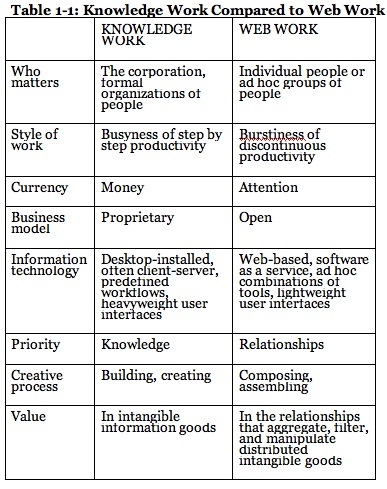Every now and there a pundit, a reporter and today, a blogger comes across a framework, an idea basis that is really, really powerful at describing the state of an industry, the state of mind or the state of the world. In terms of understanding how work has changed, and in particular how my work has changed these past few years, Anne Zelenka at Gigaom.com seems to have hit the nail on the head with an entry that struck a cord with me (and lots of others).
Sometimes they even dream up a clever way to describe it – web 2.0, web 3.0…. yuck. Thankfully Anne didn't do that although she did refer to web 2.0 and web 3.0 in the same post.
Here's the post and the ultra-relevant table 1.1:
 Here the insight is contrasted for all to see – the knowledge worker and the web worker. My favorite dimensions are the currency and priority of the two modes of work.
Here the insight is contrasted for all to see – the knowledge worker and the web worker. My favorite dimensions are the currency and priority of the two modes of work.
Anne goes on to suggest that leading examples of Knowledge work include Microsoft while the best example of web work is Google.
My comment was to point out that in web work, it's not so much that Google offered a distributed or flat model of innovation, investing in dozens of fields to have only some grow up to be big plants as compared to Microsoft which plows through whole industries with the arrogance of monopolists to earn the respect of a few customer-bigots and the scorn of a host of former industry insiders. My observation is that another way of describing the value of Google's advances is not the value that comes not from the content, but value that comes from the meta content – information about the content. This is why Google's success is not from a search engine, or from online advertising. Google's success is from being the first and according to search engine users, the best at analyzing and presenting information about the content I am contemplating at the moment.
I wrote about the value of meta data in the report Hardware-as-a-Service.






